
Goliad is a city and the county seat of Goliad County, Texas, United States. It is known for the 1836 Goliad massacre during the Texas Revolution. It had a population of 1,620 at the 2020 census. It is part of the Victoria, Texas, Metropolitan Statistical Area.
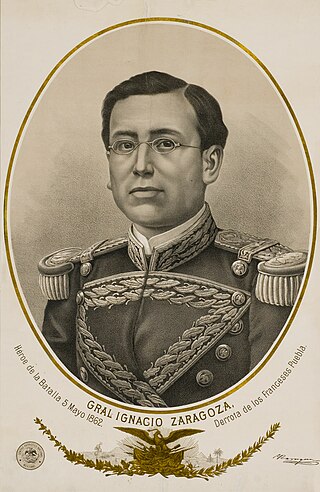
Ignacio Zaragoza Seguín was a Mexican Army officer and politician. He is best known for leading a Mexican army of 3,791 men which defeated a 5,730-strong force of French troops at the battle of Puebla on May 5, 1862 during the second French intervention in Mexico. The Mexican victory is celebrated annually as Cinco de Mayo.

The Battle of Puebla, also known as the Battle of May 5 took place on 5 May 1862, near Puebla de los Ángeles, during the second French intervention in Mexico. French troops under the command of Charles de Lorencez repeatedly failed to storm the forts of Loreto and Guadalupe situated on top of the hills overlooking the city of Puebla, and eventually retreated to Orizaba in order to await reinforcements. Lorencez was dismissed from his command, and French troops under Élie Frédéric Forey would eventually take the city, but the Mexican victory at Puebla against a better equipped force provided patriotic inspiration to the Mexicans.
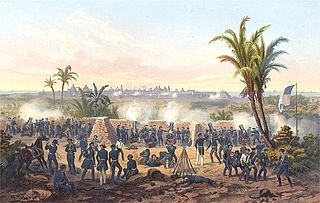
On 9 March 1847, during the Mexican–American War, the United States military made an amphibious landing and besieged the key Mexican seaport of Veracruz. The port surrendered twenty days later. The U.S. forces then marched inland to Mexico City.

The Battle of Huamantla was a U.S. victory late in the Mexican–American War that forced the Mexican Army to lift the siege of Puebla.
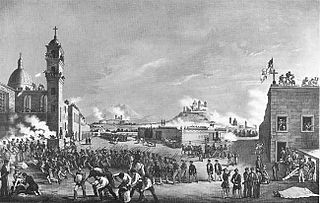
Following the Battle of Chapultepec, Santa Anna withdrew his forces from Mexico City, leading a portion in an attempt to take Puebla and cut off Scott's supply route from Veracruz. The siege of Puebla began the same day Mexico City fell to Winfield Scott and lasted for 28 days before a relief force fought its way into the city.
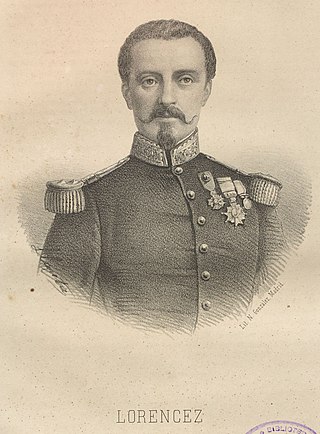
Charles Ferdinand Latrille, Comte de Lorencez was a French Army general under Napoleon III during the 19th century. He was a relative of the Empress Carlota of Mexico, who was the only daughter of King Leopold I, King of the Belgians and wife of Maximilian I of Mexico. He was most notable for losing the Battle of Puebla in the early stages of the Second French intervention in Mexico although he would continue to have military command during France's war with Prussia.

Aquila is a municipality in the Mexican state of Veracruz. It is located about 136 km from state capital Xalapa to the south-west. It has a surface of 35.37 km2. It is located at 18°48′N97°18′W.
Maltrata is a municipality in the Mexican state of Veracruz. It is located in the central zone of the state, about 209 km from the state capital Xalapa. It has a surface of 132.43 km2. It is located at 18°49′N97°17′W.
San Diego la Meza Tochimiltzingo is a town and municipality in the Mexican state of Puebla in south-eastern Mexico.

Zacapoaxtla Municipality is a municipality in the Mexican state of Puebla in south-eastern Mexico.

The Battle of La Carbonera was fought on 18 October 1866 during the Second French intervention in Mexico.
Zaragoza is a municipality in the Mexican state of Puebla. Zaragoza was named after the city of Zaragoza, Spain, since among the first settlers of the place families were some of the city from Aragon. That is why today in Zaragoza is dedicated to the Virgen del Pilar, patron de la Hispanidad.

The Battle of 2 de Abril was fought on April 2, 1867, in and around the city of Puebla, Puebla. It was one of the major military actions in the Franco-Mexican War between elements of the Mexican Army of the Republic commanded by General Porfirio Díaz and troops in the service of the Mexican Empire composed of Mexican imperialist soldiers.

General Zaragoza is a municipality and town of the northeastern Mexican state of Nuevo León. It is located in the south-eastern part of the state. The town is at 23°58′25″N99°46′23″W. The municipality has a total area of 508 square miles (1,315 km2) and had a population of 5,942 in 2010. Most of the population lives in the town of Zaragoza. The elevation of Zaragoza is 4,520 feet (1,379 m). Zaragoza is bordered by Aramberri, on the south and east by Hidalgo, Tamaulipas, and on the west by Doctor Arroyo.

The Zaragoza Birthplace State Historic Park is located adjacent to Presidio La Bahía in Goliad State Park and Historic Site, Goliad County in the U.S. state of Texas. An amphitheater and bronze statue of Ignacio Zaragoza are also on the grounds.

The Battle of Barranca Seca was a battle of the Second French intervention in Mexico and took place right after the Battle of Puebla on 18 May 1862. Contrary to the latter it was won by the unified reactionist Mexican-French forces. The battle was preceded by a coup de chef of the reactionist forces, which was heated by the intrigue of the Spanish high command against Almonte and Márquez and French pressure towards the replacement of Zuloaga. After the battle Almonte remained the only contender for the Commander-in-Chief office within the reactionist party and Márquez as acting General; both of them serving French interests.
Ciriaco del Llano was a Peninsular Spanish General who notably commanded royalist forces during the Mexican War of Independence. Amongst his more famous battles, he commanded troops in the Siege of Cuautla.
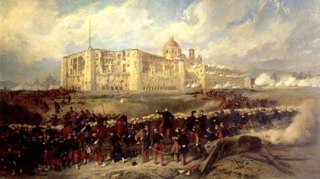
The siege of Puebla occurred between 16 March and 17 May 1863 during the Second French intervention in Mexico, between forces of the Second French Empire and forces of the Second Federal Republic of Mexico. The French were advancing toward Mexico City, and were blocked by Mexican troops at Puebla.

José Miguel Pascual Negrete Novoa, commonly known as Miguel Negrete was a 19th-century Mexican Major General. He participated in the many Mexican Civil Wars, as well as the Mexican–American War and the Second French intervention in Mexico. Negrete was also the Governor of Puebla from October 13, 1863, to November 4, 1863, and the Minister of War and Navy of Mexico from March 16, 1864 to August 23, 1865.















